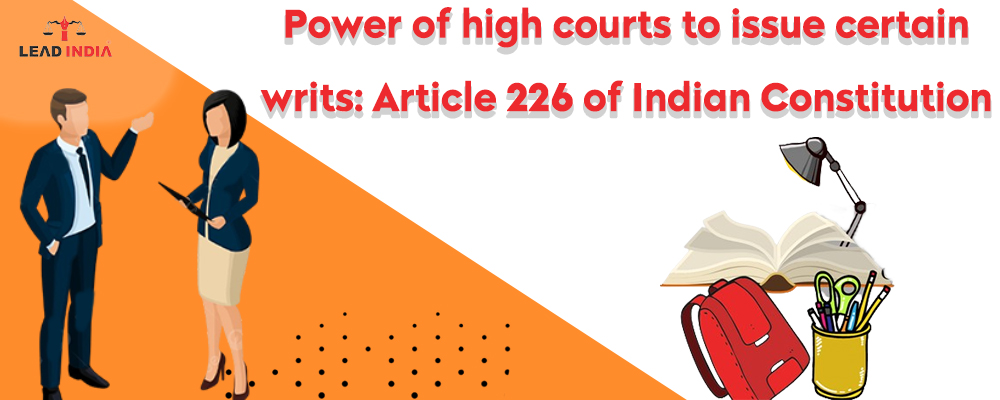Some essential rights, also known as human rights, are guaranteed to the citizens of India under the constitution. The provisions that safeguard these rights have been incorporated in Part III of the Indian Constitution, sometimes referred to as the Magna Carta of India. Articles 12 through 35. The State is charged with the responsibility of defending the citizens’ basic rights. A citizen has the right, pursuant to Article 226 of the Indian Constitution, to petition the High Court to have any of his fundamental rights violated and to have those rights upheld.
Article 226 Writ Petition: About
- Article 226 Writ Petition gives the High Courts the ability to grant writs to any person or authority, including the government, in the form of prohibition, quo warranto, habeas corpus, certiorari, mandamus or any combination of these.
- High Courts in India are empowered under Article 226 of the Indian Constitution to uphold any of the fundamental rights that are outlined in Part III of the Indian Constitution, 1949, or for any other purpose.
Need A Legal Advice
The internet is not a lawyer and neither are you. Talk to a real lawyer about your legal issue

Article 226 Writ Petition: Types
The types of writs as per Article 226 of the Indian Constitution are as follows:
- Writ of Habeas Corpus: The most potent and frequently utilized script is this one. When the High Court exercises this writ, questions the State regarding the rationale behind the person’s detention. The individual is released from custody right away if the basis is determined to be illogical.
- Writ of Mandamus: A mandamus is a court order that requires all public officials to carry out their official duties. It takes the form of an order to the executive branch, requesting that it fulfil its obligations or refrain from breaking the law by undertaking a specific act. It assists in carrying out the duties mandated by the law or by a person’s position.
- Writ of Certiorari: With the use of this writ, the High Court can mandate that records from lower courts be turned in for examination. The purpose of these reviews is to figure out if the lower court’s decisions were lawful. If they make decisions that go against natural justice principles, unconstitutional jurisdiction, beyond their authority, or neither, then their decisions might be unlawful.
- Writ of Quo Warranto: It is issued against somebody who holds an office over which he has no legal power. The sole relevance to it is a substantive public office. Using this writ, the court can prevent the illegal appointment of public officials and shield citizens from being denied the opportunity to hold public office to which they may be legally entitled.
- Writ of Prohibition: This writ is only applicable up until the point at which the verdict is not rendered. A writ of prohibition is issued to stop a lower court or tribunal from acting unconstitutionally or against the principles of natural justice. The issuing of this writ stops the lower court’s proceedings. A writ of prohibition may be granted on the same grounds as a writ of certiorari, with the exception of situations where there is an obvious legal error on the face of the record.
How do Lawyers help you File Article 226 Writ Petition?
Drafting the Writ Petition
The petition needs to be carefully drafted, outlining the essential legal provisions, facts, and arguments. It must explicitly declare if the relevant authority’s actions were unlawful or a breach of fundamental rights. Getting assistance from a lawyer to draft Article 226 Writ Petition is advisable.
Preparation of Affidavits
It is necessary to prepare supporting affidavits with all pertinent information and documentation. In this case, these affidavits are used as evidence.
Payment of the Required Court Fees
It is necessary to pay the court fees as specified by the rules. The sum varies based on the case’s worth and character.
Filing of the Article 226 Writ Petition
The pertinent court should receive the writ petition, accompanying papers, and affidavits. As mandated by the court, the petitioner must make sure that several copies are filed.
One can talk to a lawyer from Lead India for any kind of legal support. In India, free legal advice online can be obtained at Lead India. Along with receiving free legal advice online, one can also ask questions to the experts online free through Lead India.





 Talk to a Lawyer
Talk to a Lawyer